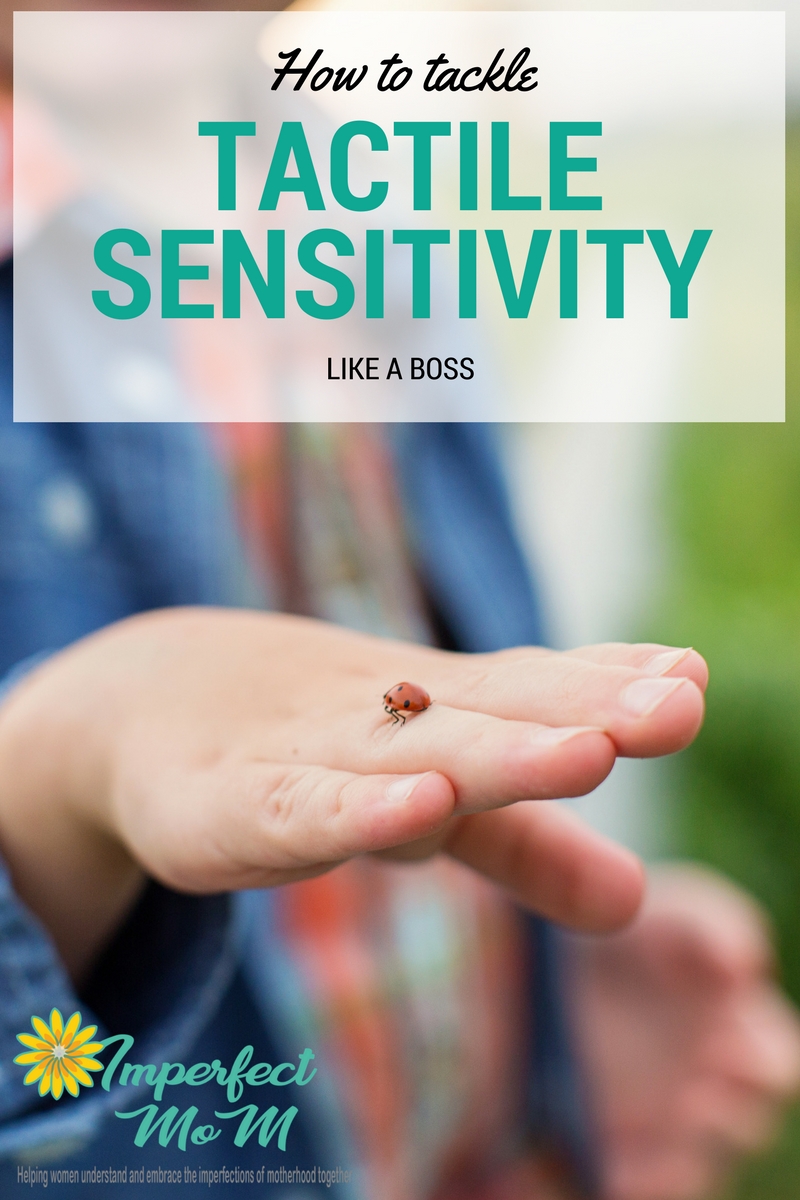Tactile Sensitivity – How to Tackle It Like A Boss
If your child has been known to flare up, become frustrated, or seem to avoid particular sensations, it could be due to a tactile sensitivity you may not have noticed before.
Listen up and I’ll show you how to identify sensitivities to touch and how to understand them like a BOSS!
Be sure to learn more about Sensory Processing Disorder and my parenting tips on how to support your child with sensory challenges.

Tactile Sensitivity- What is it and everything you need to know to support it like a BOSS!
One particular evening during my teenage years, having sand in my toes and I did not like it.
I had spent time with my family playing sand volleyball which I really enjoyed.
Afterwards, however, as I stepped with my sandy feet onto the dry cement, I went into sensory overload.
I didn’t know it at the time, but I have a tactile aversion to my hands and feet being dry.
I tried wiping the sand off my feet, but the dirt and dry feeling remained.
My irritation grew stronger the harder I tried.
I looked for a place to wash myself off but there was nothing.
I stopped talking to my family, I had an anxious feeling inside of me, my mind was focused on how irritated I was that my hands and feet were dry.
I absolutely shut down, and didn’t know why.
Once I learned about my own sensory aversions, this experience suddenly made sense.
Being in the sand was something I could manage while I was playing volleyball, but the feeling of sandy feet on the dry cement pushed me over the edge into sensory overload.
My brain focused only on the sensory overload and didn’t allow me to function until I fixed it.
If the feel of something has ever thrown your child (or you) into an irritated or uptight state, tactile aversion could be the reason.
OR on the other hand, if the LACK of a certain feeling (physical feeling, not emotional) has ever upset your child, the LACK of tactile stimulation could be the reason.
(Read more about the difference between sensory aversion and sensory needs here).
Tactile Sensitivity Definition
Tactile means touch, that is the simplified definition.
A person can seek tactile stimulation or avoid it, as with every other sensory area.
Tactile sensitivity or aversion is an over-sensitivity to a specific feeling of touch.
For me it was the feeling of dryness.
Often times a tactile aversion will manifest itself in a child who avoids walking barefoot on grass, carpet, cement, or other surfaces that are unpleasant to him.
It can also include a child who needs to have clean hands, and becomes irritated if he can’t wipe them off.
Something as simple as clothing tags or sock hems can also cause a lot of irritation to a child who is overly sensitive to the sensation of such things on the skin.

How To Address Tactile Sensitivities
While it can be frustrating to be on the receiving end of the tantrums, or irritation that arise due to a sensitivity, I can assure you that punishing such behavior won’t make matters any better.
Sensitivities like this don’t just go away with time.
They need to be addressed, communicated openly, and nurtured with patience.
To address these sensitivities I recommend the following;
First, Talk about what might be irritating your child
Use phrases like:
“How does your body feel?”
“What does your body feel like when you touch/wear/walk in ___”
Just as some bodies can tolerate gluten or dairy, while other’s can’t, it isn’t a cognitive choice to be able to tolerate all sensations out there.
The body truly does determine what it likes and doesn’t like, so don’t make your child own the sensitivity as if it were a preference or something they need to “get over.”
Rather, it is something that can easily be worked through with targeted sensory activities.
Second, Help Your Child Participate in Other Ways
Here’s where you get to be creative.
If your child’s body doesn’t tolerate certain textures on his/her feet, allow shoes or socks to be worn more often.
If touching things with the hands is irritating, have a wet rag available to wipe any irritating feeling away as soon as possible while participating in messy activities.
If your child doesn’t like the feel of certain clothing, find something that does work and let the models worry about wearing the latest and greatest fashion trends.
If your child doesn’t like a certain texture of food, again, it is nothing to force.
Allow your child to still have a healthy and positive relationship with that food by exploring it with other senses (smell it, look at it as it is poked or mashed, listen to it as you bend it or break it in half, etc.)
These tips are simple for a reason.
Supporting sensory aversions doesn’t have to be frustrating, demeaning, or a full time job.
With a little communication and creativity, you can support those sensitivities like a boss and never look back.
Had I known these things as a teen, that evening playing volleyball could have ended much differently.
Simply carrying a bag of wipes and a bottle of lotion to wash my feet after the game could have helped us all avoid the frustration or my tactile aversion that day.
How many tantrums and irritations can you avoid by supporting your child’s tactile aversions like a boss?
For further reading about Sensory Processing Disorder:
The Out-of-Sync Child: Recognizing and Coping with Sensory Processing Differences Raising a Sensory Smart Child: The Definitive Handbook for Helping Your Child with Sensory Processing Issues
Raising a Sensory Smart Child: The Definitive Handbook for Helping Your Child with Sensory Processing Issues Understanding Your Child’s Sensory Signals: A Practical Daily Use Handbook for Parents and Teachers
Understanding Your Child’s Sensory Signals: A Practical Daily Use Handbook for Parents and Teachers The Out-of-Sync Child Has Fun, Revised Edition: Activities for Kids with Sensory Processing Disorder
The Out-of-Sync Child Has Fun, Revised Edition: Activities for Kids with Sensory Processing Disorder
About the Guest Author
This post originally appeared on WendyBertagnole.com and is reprinted with permission.
With an undergraduate degree in child development, and a master’s degree in special education, this foundation was a springboard for Wendy in helping kids and families to see the root of any challenges they face.




